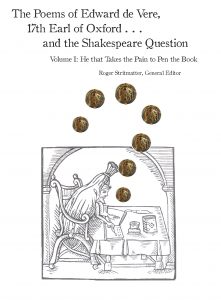First in New Scholarly Book Series
 At a time of year when the Shakespeare establishment commemorates the life of a man from Stratford-upon-Avon who cannot be proved to have ever attended a school, written a letter, or owned a book, the Shakespeare Oxford Fellowship is celebrating the life and poetry of Edward de Vere, 17th Earl of Oxford (1550–1604), a man with a far stronger claim to have been the author “Shakespeare.”
At a time of year when the Shakespeare establishment commemorates the life of a man from Stratford-upon-Avon who cannot be proved to have ever attended a school, written a letter, or owned a book, the Shakespeare Oxford Fellowship is celebrating the life and poetry of Edward de Vere, 17th Earl of Oxford (1550–1604), a man with a far stronger claim to have been the author “Shakespeare.”
The Poems of Edward de Vere, 17th Earl of Oxford … and the Shakespeare Question, Volume I: He That Takes the Pain to Pen the Book, is the first in a series of books published by the Shakespeare Oxford Fellowship on the authorship question, edited by Roger Stritmatter, Ph.D., Professor of Humanities at Coppin State University in Baltimore. Professor Stritmatter previewed the book at the October 2018 SOF conference in Oakland, California.
The book series honors and perpetuates the “Brief Chronicles” title of the former annual scholarly journal of that name, also edited by Professor Stritmatter. This first book compares de Vere’s early known and suspected poetry to the works published under the name “William Shakespeare.” The study was launched in a preliminary online version published on the SOF website in June 2018. (Update: This study has since developed into a multi-volume scholarly opus. Volume I, He That Takes the Pain to Pen the Book, will be revised and republished, along with additional volumes, during 2021.)
Following the de Vere poetry study, the next book in the Brief Chronicles series will be The Shakespeare Authorship Sourcebook: A Workbook for Educators and Students. (Update: Advance copies of this book were distributed to educators at the National Council of Teachers of English (NCTE) convention in Baltimore in November 2019. The book is being revised and prepared for general publication during 2021.)
The new book is the first scholarly printed edition in modern times of this greatly under-appreciated body of Elizabethan poetry. It contests the popular misconception of de Vere as an “intellectual lightweight,” “monstrous adversary,” and rotten poet. On the contrary, closely examined, he emerges as a deeply original poetic voice. The foremost 19th century British literary scholar, Alexander Grosart, declared in 1872 that an “unlifted shadow … lies over his memory.”
This comparative study of de Vere’s place in the development of Elizabethan poetics makes it apparent that by a very early date, the young earl was anticipating what “Shakespeare” would later do. He pioneered techniques, modes of inquiry, topics, themes, motifs, vocabulary, figures of speech, and diction later recurrent in the works of Shakespeare, which only started to appear in print some years later during the 1590s. The range and variety of these parallelisms are sampled in detailed notes that walk the reader through this collection of 21 fascinating poems confidently attributed to de Vere and another 11 poems possibly written by him.
Professor Stritmatter has published numerous articles in peer reviewed journals of literary studies, psychoanalysis, anthropology, and forensic studies. His groundbreaking 2001 University of Massachusetts dissertation, on correlations between Biblical passages referenced in Shakespeare’s works and de Vere’s handwritten notations in his Geneva Bible, earned him the first-ever Ph.D. awarded for the study of the Shakespeare authorship question. His work was featured in a February 10, 2002, New York Times article by William S. Niederkorn. The 2017 fourth edition of the Index to Oxfordian Publications identifies 116 articles by him, more than twenty in peer-reviewed academic journals, including The Shakespeare Yearbook, Review of English Studies, Notes and Queries, and the Scandinavian Psychoanalytic Review. He is the author, with award-winning writer Lynne Kositsky, of On the Date, Sources and Design of Shakespeare’s The Tempest (McFarland, 2013), and, with Alexander Waugh, The New Shakespeare Allusion Book (forthcoming 2020). He has appeared in two Shakespeare authorship documentaries, Last Will. & Testament (2012) and Nothing Is Truer Than Truth (2018).
[published April 27, 2019, updated Oct. 2020]


